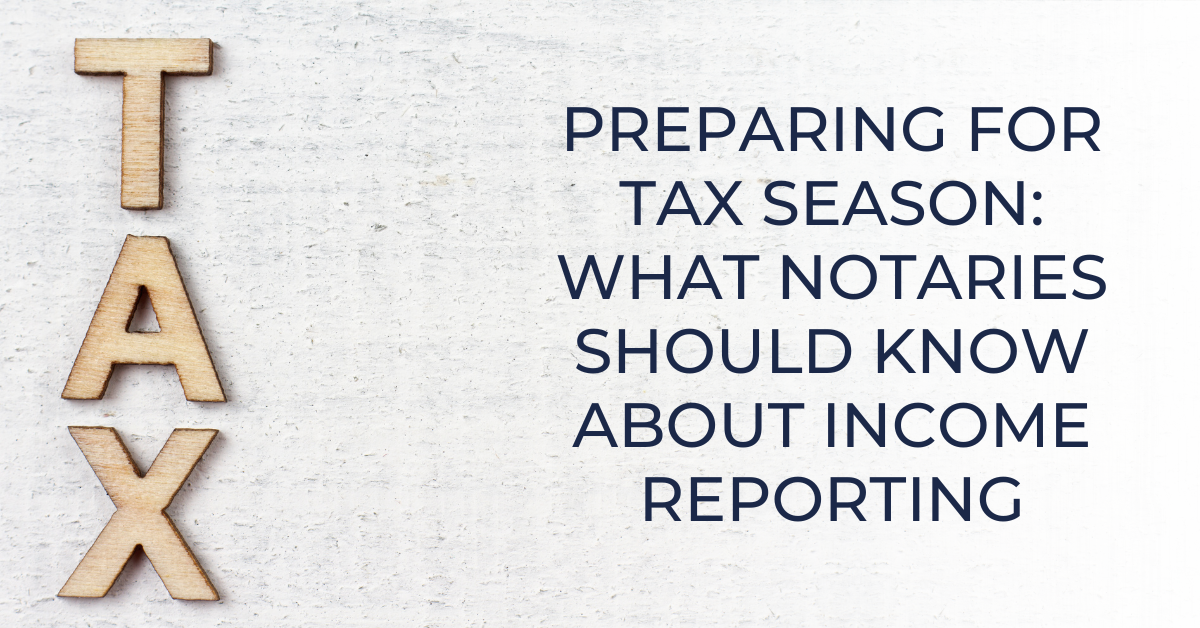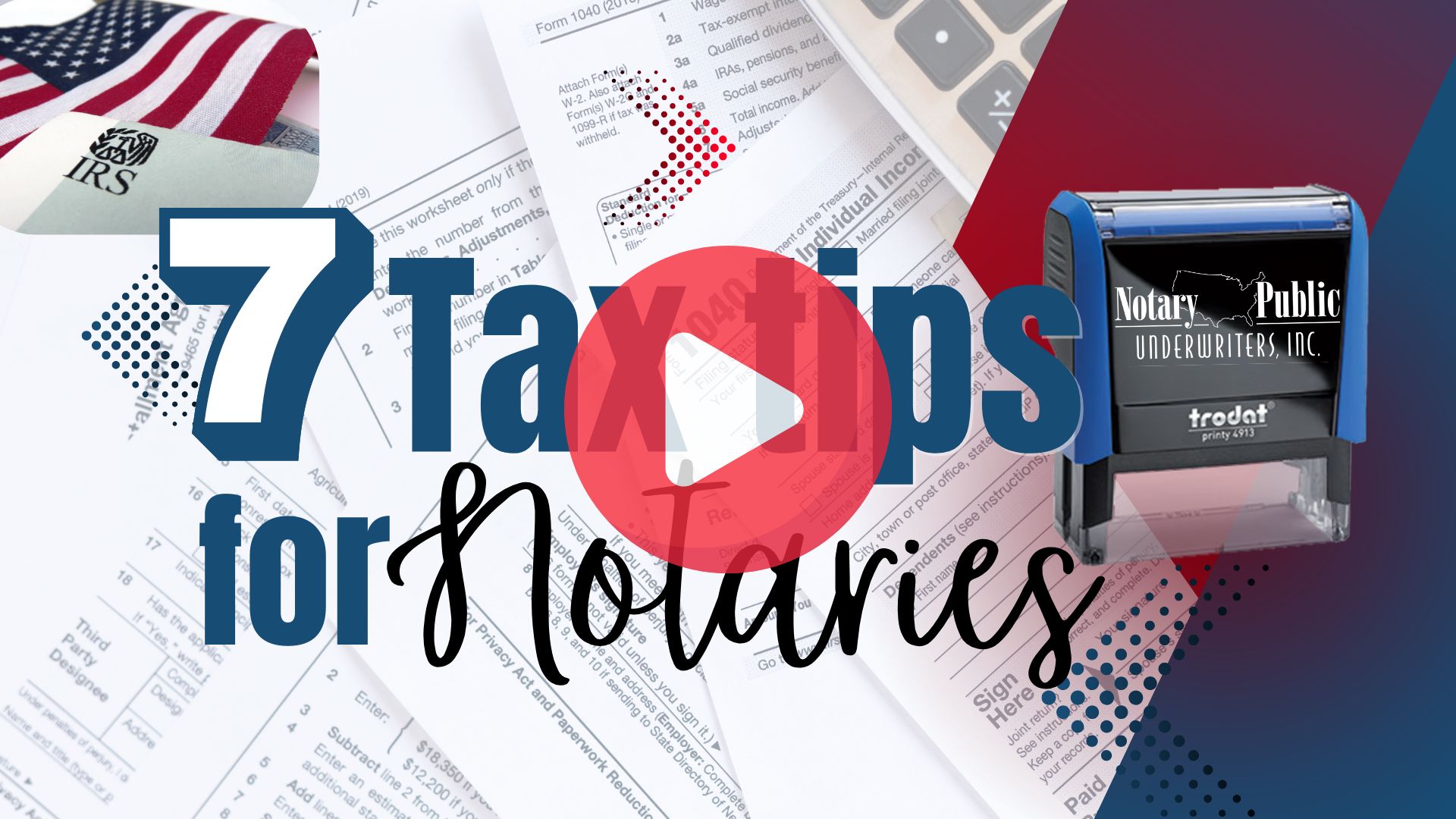Notary Public Underwriters Blog
Preparing for Tax Season: What Notaries Should Know About Income Reporting
- Details
- Published: March 10, 2025

It’s the “tax time” of year…! With it comes a lot of discussion about income reporting when you’re a sole proprietor, which many hard-working notaries public are.
With the deadline for filing your tax return looming, are you facing a time-consuming hassle or a piece of cake to compile and report your 2024 notary income?
The answer depends on your past diligence. Here’s a handy list of the income recordkeeping steps you should practice throughout the year, to make reporting it every April a breeze.
1. Organize and Track All Income.
Keep records of all payments received for notarizations, including fees or reimbursements for travel expenses. We strongly suggest line-iteming fees for notarial acts separately from fees for services that did not involve performing a notarial act. Do this in your customer receipts and in any records you keep. Why: the fees solely for performing an actual notarial act are exempt from self-employment tax. Any other earnings from your notary business that exceed $400 are subject to taxation. (See the NOTE below for additional comments.)
Use accounting software or spreadsheets to organize income. Categorize and date each transaction for easy reference, and include both cash and non-cash payments (e.g., checks or electronic payments).
2. Issue Invoices/Receipts.
It’s wise for any service provider, including notaries, to issue invoices or receipts for services rendered, even if there’s no requirement to do so. This helps establish a paper trail of your income, which is essential for accurate reporting and for addressing any questions that might arise from your return. If you are paid electronically, be sure to obtain a receipt or similar record of payment from the payer or the platform the payer uses.
3. Understand Common Tax Forms.
- Schedule C: Notaries will typically file a Schedule C (Profit or Loss from Business—Sole Proprietorship) if they are self-employed. This form details income and business-related expenses, including travel, supplies, and other costs.
- 1099-NEC: If a notary earns over $600 from a single client in a year, that client should issue the notary a 1099-NEC form. This form reports non-employee compensation.
4. Pay Estimated Taxes Timely, If Applicable.
Since notaries are often self-employed, they may need to pay estimated taxes quarterly (the due dates for a year’s self-employed income reporting are typically in April, June, and September of the current tax year and January of the following year). Visit the IRS’s website (https://www.irs.gov/businesses/small-businesses-self-employed/self-employed-individuals-tax-center ) to learn more about income reporting requirements for self-employed persons.
NOTE: The income you receive from doing business as a notary public must be reported to the IRS. Of that income, only your state-authorized, notarial-act fees you received for each notarial act you performed are exempt from self-employment tax. The IRS states that your other earnings of $400 or more must be accounted for; follow the IRS instructions for Schedule SE.
5. Track Expenses.
Notaries can deduct some business-related expenses to lower taxable income. Such deductions are complicated… talk to a tax professional (see Item 7 below) to be sure you aren’t inadvertently taking a deduction that you shouldn’t. Assess information freely available on the internet very carefully... some of it is good, some is misguided and some is clearly incorrect.
6. Stay Organized.
Maintaining organized records throughout the year makes it easier to report income and deductions. Good organization also helps avoid mistakes that could lead to penalties.
7. Consult with a Tax Professional.
Tax laws are complicated. Self-employed notaries and those earning notary income on the side should consider consulting a tax professional or accountant at least once every year to two years, especially if their business is profitable (because the tax liability for reporting errors could be unexpectedly high).
By keeping good records, researching their tax obligations, making timely payments and seeking professional advice on a regular basis, notaries can comply with their income reporting requirements, potentially lower their taxable income, reduce tax preparation mistakes, and keep their focus on being the best possible notary public they can be for their clients.
NOTE: Notary Public Underwriters does not represent that the information in this article is expert tax advice. Seek help or guidance from a tax advisor or similar professional.
Check out our Youtube video below
Related Article(s)
Should Notaries Accept Tips? What Every Notary Needs to Know
Tracking Notary Business Expenses
Ch-Ch-Changing: Why It’s Important to Keep Your Notary Information Current
Top Ten Mistakes That Notaries Make
Questions for Notaries to Ask Before Scheduling an Appointment With a Client
Fighting Fraud: Why Notaries Should Avoid Using Signature Stamps
How To Get More Business As A Notary Signing Agent
Medallion Signature Guarantees Explained

